Muriel Matters
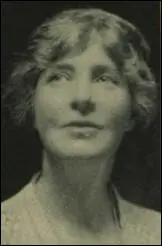
Mabel Muriel Matters, third of ten children of John Leonard Matters, a cabinetmaker, and his wife Emma Warburton Matters, was born on 12th November 1877 at Bowden, Adelaide, Australia. Her father was a cabinet maker and a strong Methodist. As a child she was introduced to the writing of Walt Whitman and Henrik Ibsen. (1)
The work of Ibsen had an impact on her political consciousness. She later explained: "'I shall never forget my joy in finding that the sentiments I had always vaguely but keenly felt had been put into words, forcible, majestic, dignified." (2)
Muriel Matters took a keen interest in women's equal rights. She lived in a part of Australia that had gained attention for being the first self-governing territory to give women equal franchise on the same terms as it was granted to men. By 1900 most Australian states had granted many women, although not Aboriginal women, the right to vote. (3)
Matters studied music and found work with the Robert Brough Comedy Company. In 1901 she performed at the Cowandilla Salon and the following year she directed Sweet Lavender, a play by Arthur Wing Pinero. During this period she became very interested in politics. She was described as "a slight, attractive and vivacious woman with a mass of golden hair." (4)
In 1906 she came to Britain, initially for her musical career. She also worked as a freelance journalist and interviewed the elderly Russian anarchist, Peter Kropotkin, who was living in exile in London. They became friends and she later performed at his home. Kropotkin challenged Muriel to do something more useful with her talents than acting. She responded to this challenge by joining the Women's Social and Political Union (WSPU). (5)
Muriel Matters and Women's Suffrage
In a conference in September 1907, Emmeline Pankhurst told members that she intended to run the WSPU without interference. As Emmeline Pethick-Lawrence pointed out: "She called upon those who had faith in her leadership to follow her, and to devote themselves to the sole end of winning the vote. This announcement was met with a dignified protest from Mrs. Despard. These two notable women presented a great contrast, the one aflame with a single idea that had taken complete possession of her, the other upheld by a principle that had actuated a long life spent in the service of the people. Mrs. Despard calmly affirmed her belief in democratic equality and was convinced that it must be maintained at all costs. Mrs. Pankhurst claimed that there was only one meaning to democracy, and that was equal citizenship in a State, which could only be attained by inspired leadership. She challenged all who did not accept the leadership of herself and her daughter to resign from the Union that she had founded, and to form an organisation of their own." (6)
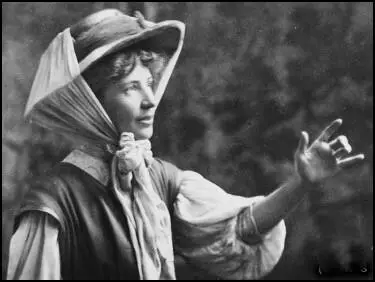
Emmeline Pankhurst and Christabel Pankhurst sent out a letter to all branches of the WSPU stating that this was not in any way a democratic group. "We are not playing experiments with representative government. We are not a school for teaching women how to use the vote. We are a militant movement... It is not a school for teaching women how to use the vote. We are militant movement... It is after all a voluntary militant movement: those who cannot follow the general must drop out of the ranks." As Simon Webb has pointed out: "This is quite unambiguous. Members must not expect to influence policy or question the leader, the role is limited to obeying orders." (7)
Women's Freedom League
As a result of this speech, Muriel Matters, Helen Fox, Charlotte Despard, Teresa Billington-Greig, Edith How-Martyn, Violet Tillard, Dora Marsden, Helena Normanton, Anne Cobden Sanderson, Octavia Lewin, Emma Sproson, Margaret Nevinson, Henria Williams and seventy other members of the WSPU left to form the Women's Freedom League (WFL). Most of its members were socialists who wanted to work closely with the Labour Party who "regarded it as hypocritical for a movement for women's democracy to deny democracy to its own members." (8)
In 1908 Violet Tillard became Assistant Organising Secretary of the WFL. In May 1908 she helped establish branches of the League on a caravan tour of of Kent, Surrey, and Sussex. Muriel Matters joined her on the tour and they became very close friends. Matters would later write of her friend's courage, sympathy, generosity and selflessness, stating that Tillard, "set one a standard to live by". (9) The meetings they held often became so lively that the women had to seek police protection. (10)
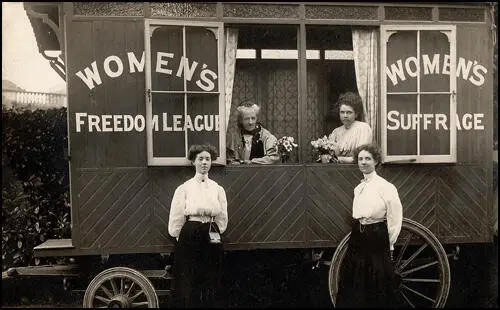
Irene Tillard and Violet Tillard standing in front of the caravan.
Charlotte Despard also joined them on what she called "an interesting and health-giving form of propaganda". The horse was named "Asquith" because he was "driven by women to assist the cause of votes for women." Margaret Mulvihill has pointed out: "The political conditions encountered by the WFL roadshow was frequently variable: flowers and 'opera star' treatment at one village, violence or, worse, apathy, at the next." (11)
The Daily Mail reported about a incident that took place in Hastings: "There has been a week's open air campaign in Hastings by the Suffragettes. Using the Women's Suffrage Van, it began on Tuesday 14th. The two orators were Miss Muriel Matters and Miss Eustace Smith. A meeting was held at Wellington Square on the evening of the 15th, with no opposition offered. At an open air meeting at the Fishmarket on Thursday evening about 30 youngsters surrounded them, to some amusement. (12)
House of Commons Demonstration
On 28th October 1908 Muriel Matters organised a Women's Freedom League demonstration that would gain the maximum publicity. Matters and Helen Fox were in the ladies' gallery of the House of Commons, then enclosed from the rest of the chamber by a metal grille. The two women interrupted the business of the house by demonstrating for women's suffrage. "While attached to the grille Matters, by a legal technicality, was judged to be on the floor of Parliament and thus, the words spoken by her that day are still considered to be the first delivered by a woman in the House of Commons." (13)
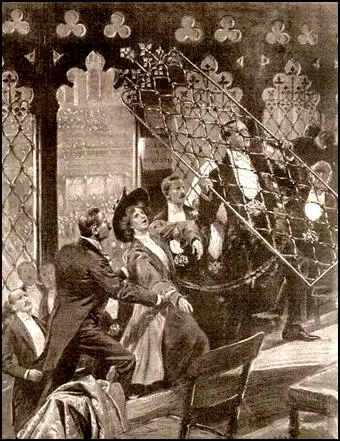
When officials made attempts to remove them, it was discovered that they had chained and padlocked themselves to the grille in such a way that in order to remove them the grille would have to be removed as well. The two women sat in a committee room until a locksmith was found to separate them from the thirty-foot long grille. (14)
Muriel Matters then went round to join the demonstration taking place in front of Parliament. Fifteen arrests were made including Matters, Violet Tillard, Arnold Cutler, Edith Bremer, Emily Duval, Margaret Henderson, Alison Neilans, Marion Leighfield. (15) Matters was charged with disorderly conduct and after being found guilty she was sent to Holloway Prison for a month. After her release she adopted the cause of prison reform. (16)
On 17 February 1909, the day the Women's Freedom League returned from recess, Muriel Matters hired a pilot and an airship, which she had painted with the words "Votes for Women" in gigantic lettering. (17) Armed with 56lb of Women's Freedom League pamphlets she flew from the Welsh Harp, Hendon, at heights of up to 3500 feet, with the intention of flying over Parliament.The weather conditions and a poor motor meant that Muriel didn't make it to Westminster, but she did fly over outer London for one and a half hours scattering leaflets as she went. Her exploit was a success as it created publicity for the suffrage movement generating headlines in newspapers around the world. (18)
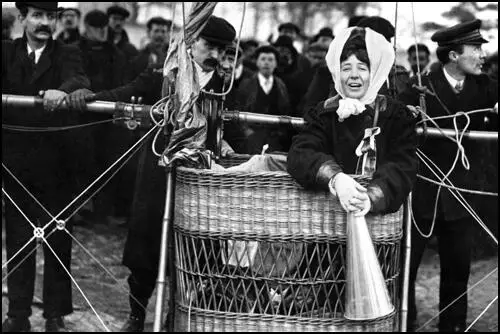
Muriel Matters was appointed Women's Freedom League organizer for south Wales, based in Carmarthen. During the 1910 General Election campaign in January she concentrated her activities in the constituency of David Lloyd George, the Chancellor of the Exchequer. Matters joined the Labour Party and in October 1913 she helped to persuade the National Union of Mineworkers to declare in favour of women's suffrage. She was also involved in the Church League for Women's Suffrage. (19) As Fayette Gosse has pointed out: "Her flair for dramatic acts of non-violent civil disobedience helped her attract valuable attention and publicity for the cause of women's suffrage." (20)
Tax Resistance League
The Women's Freedom League (WFL) established the Women's Tax Resistance League (WTRL). The first member to take part in the campaign was Dr. Octavia Lewin. It was reported in The Daily Chronicle that the "First Passive' Resister", was was to be taken to court. It was announced in the same report that "the Women's Freedom League intends to organise a big passive resistance movement as a weapon in the fight for the franchise." (21)
Muriel Matters became active in the campaign. (22) Over the next few years over 220 women took part in this campaign. This included Janie Allan, Charlotte Despard, Beatrice Harraden, Teresa Billington-Greig, Edith How-Martyn, Cicely Hamilton, Dora Marsden, Helena Normanton, Anne Cobden Sanderson, Emma Sproson, Margaret Nevinson, Octavia Lewin, Henria Williams, Violet Tillard, Edith Zangwill, Sophia Duleep Singh and Clemence Housman.
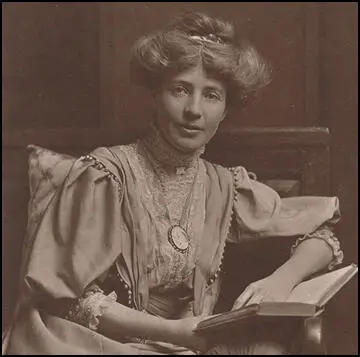
Sylvia Pankhurst, the author of The History of the Women's Suffrage Movement (1931): has argued: "Tax resistance and resistance to enumeration under the Census of that year were mild forms of militancy now in vogue. The Women's Freedom League had hoisted the standard of 'no vote, no tax' in the early days of its formation, and Mrs. Despard and others had suffered a succession of distraints, to the accompaniment of auction sale protest meetings... In May, 1911, two women were imprisoned for refusal to take out dog licences. A little later, Clemence Housman, sister of the author-artist, Laurence Housman, was committed to Holloway till she should pay the trifling sum of 4s. 6d., but was released in a week's time, having paid nothing." (23)
The First World War
Most members of the Women's Freedom League, were pacifists, and so when the First World War was declared in 1914 they refused to become involved in the British Army's recruitment campaign. The WFL also disagreed with the decision of the NUWSS and WSPU to call off the women's suffrage campaign while the war was on. Leaders of the WFL such as Charlotte Despard believed that the British government did not do enough to bring an end to the war and between 1914-1918 supported the campaign of the Women's Peace Crusade for a negotiated peace. The WFL newspaper, The Vote attacked Christabel Pankhurst and Millicent Garrett Fawcett, for condemning the women's peace conference. (24)
On 15th October 1914, Muriel Matters married William Arnold Porter, a divorced dentist from Boston, who had apparently proposed to her during the previous three years, despite his doubts about her suffrage activities. There were no children. Subsequently known as Mrs Matters-Porter, she none the less continued her political commitment and became organizing secretary of the British Committee of the International Council of Women, which in April 1915 was trying to overcome government refusal of permission to attend the International Woman Suffrage Alliance Congress in The Hague. (25) Muriel particularly objected to Christianity as a justification for war, and questioned the significance of nationality. "Views such as these were extremely unpopular at the time, and it took great bravery to voice them." (26)
Matters-Porter spent time in Spain where she trained under Maria Montessori; she returned to London and after joining the East London Federation Suffragettes, she helped run a school established by Sylvia Pankhurst in Bow. (27) She was also active in the peace movement and after the war she spoke at meetings of the Glasgow branch of the Women's International League for Peace and Freedom. (28)
Later Years
In the 1924 General Election, Matters-Porter ran as the Labour Party candidate for Hastings. She ran on a socialist platform, advocating a fairer distribution of wealth, work for the unemployed, and gender equality. Matters-Porter also favoured improving women's conditions through mechanizing the home. (29) The Conservative Party candidate, Eustace Percy, won the seat. However, she got 28.6% of the vote in this safe Conservative seat, which was 7% better than the previous Labour candidate. (30)
In June 1926 she took part in the Peacemakers' Pilgrimage, together with a number of other members of the Women's Freedom League. Subsequently she seems to have become less politically involved, devoting much of her energies to lecturing and travelling widely. (31)
Matters-Porter resigned as the Labour Party candidate for Hastings in 1927. (32) However, her brother Leonard Matters (1881-1951), a journalist, was also a member of the Labour Party and he was elected to represent Kennington in the 1929 General Election. He was defeated in the 1931 General Election and the 1935 General Election. (33)
William Arnold Porter died in 1949. Muriel continued to live an unconventional life and she was remembered locally as being partial to a spot of skinny dipping at the nearby Pelham Beach. (34)
Muriel Matters-Porter, aged 92, died of pneumonia at St Anthony's, West Hill Road, St Leonards, on 17 November 1969. She was buried at Hastings borough crematorium on 24 November in the presence of members of the Suffragette Fellowship. (35)
Primary Sources
(1) The Daily Mail (18th July, 1908)
There has been a week's open air campaign in Hastings by the Suffragettes. Using the Women's Suffrage Van, it began on Tuesday 14th. The two orators were Miss Muriel Matters and Miss Eustace Smith. A meeting was held at Wellington Square on the evening of the 15th, with no opposition offered. At an open air meeting at the Fishmarket on Thursday evening (16th) about 30 youngsters surrounded them, to some amusement.
(2) Exmouth Journal (31 October 1908)
Suffragettes cause of another scene in the House of Commons on Wednesday evenings. Two women chained themselves to the grille in front of the Ladies' Gallery, and a portion of the grille had to be removed by the police in order to release them…
Disturbances also occurred at the same time outside the House, leading to numerous arrests for disorderly conduct outside St. Stephen's Hall, and for attempting to harangue a throng at the base of the monument in front of the House of Lords. The two women who were the principal figures in the disturbances in the Ladies Gallery gave their names of Helen Fox and Muriel Matters…
No less than fifteen arrests were made in connection with the disturbances in St Stephen's Hall. They gave their names as follows: Arnold Cutler, Miss Violet Tillard, Miss Edith Bremer, Mrs. Emily Duval, Miss Margaret Henderson, Miss Alison Neilans, Miss Marion Leighfield… They were taken to Cannon Row Police Station, and were bailed out later.
(3) Edith How-Martyn, The Vote (30th December 1909)
In October of 1908 a deputation was sent to the House of Commons, and by taking the precaution of chaining themselves to the grille in the Ladies' Gallery Miss Muriel Matters and Miss Helen Fox were able to address the House of Commons for a few minutes without interruption. The attendants tore down portions of the grille, which were carried behind the women to a committee room for the chains to be filed off. At the same time a protest was made in the men's gallery and handbills thrown on the floor of the House, while further protests were made in St. Stephen's Hall and entrance. All the galleries of the House were closed to visitors, and only re-opened months later. Twelve members were sent to prison in the third division for a month.
(4) Margaret Nevinson, The Vote (24th August 1917)
At the end of the month (24 August 1917) some members of the Women's Freedom League made a protest in the House of Commons. An extra dull debate was going on when suddenly the bored audience was electrified at hearing a woman's voice, clear and very earnest, from the gilded cage, calling upon the Legislature to give justice and freedom to women. Officials and reporters rushed breathlessly up the stairs, and the former, after attempting to drag away by force Miss Muriel Matters and Miss Helen Fox who had chained themselves to the Grille, were obliged to cut down the barrier; and the two protestants, with about twenty square feet of grating attached to them, were conducted to one of the committee rooms, where the chain was sawn through. Subsequently Miss Matters and fourteen other women were arrested and sentenced to fines of £5 or one's month imprisonment in the third division.
(5) Laura Amy Fallon, The Guardian (11th October, 2013)
She has not been much celebrated in her homeland but Muriel Matters – an Australian-born suffragist who achieved notoriety in Britain after pulling off a series of brave and quirky stunts there in the early 1900s - is finally getting the recognition she deserves. New docudrama Muriel Matters!, featuring the suffragette's story, will premiere at the Adelaide Film Festival on Sunday, 13 October, and will also screen on ABC1 the following Tuesday.
Matters, an actor who left Adelaide for Britain when she was 28 to further her musical career, once sailed over London in an airship emblazoned with "Votes For Women", dropping leaflets for the militant Women's Freedom League (WFL).
She was also charged with disorderly conduct and imprisoned after chaining herself to "that vile grille" in the Ladies' Gallery of the British House of Commons in 1908. Obscuring women's view of parliamentary debates, the piece of ironwork was considered a sign of female oppression.
And yet the South Australian has gone relatively unrecognised in her birth country. Frances Bedford MP, the secretary of The Muriel Matters Society, which was founded four years ago in Australia, thinks that part of the problem is that Matters didn't do much for the franchise in her birth country – not least because women in Australia got the vote earlier than women in Britain.
The suffragist, who was also a lecturer, elocutionist and journalist, called Britain home from 1905, by which point most Australian states had granted many women, although not Aboriginal women, the right to vote.
"While in UK, she was from the colonies, and as not one of the Pankhurst people, she was outside their recognition," says Bedford. "Also, as one of the WFL people, she was against the war – another problem at the time – and she married a divorced person, who seems to have left his wife for her."
Matters in fact turned down dentist William Arnold Porter three times. She finally married him in 1914, only when the suffrage campaign was put on ice for a while, points out Elizabeth Crawford, author of The Women's Suffrage Movement.
During her time in Britain, Matters lived in Kennington, south London. She died in Hastings, where she stood unsuccessfully for election as an MP and where a where a plaque today honours her. Bedford recently visited the town and other locations in Britain on a Matters promotional tour.
While the Australian may have been a "cog in the wheel" during the British suffrage campaign, Crawford argues that she was an "important one in a way because of the fact that she was a vote-carrying woman". This could also explain why the suffragist didn't become a household name back home. "Those women had the vote in Australia. I don't know if they were greatly concerned about what was going on over here in this backward realm," she says.
Crawford argues that Matters is "more of a role model than the window breakers", and describes Emily Wilding Davison, who died after being trampled upon by King George V's horse at the Epsom Derby in 1913, as a "bit of a one-off".
Martyrdom is not the only way by which to measure these campaigning women. "Muriel Matters I find rather more appealing. You don't have to die," says Crawford. "There was Muriel doing her stunts but in a more lighthearted way."
(6) Hannah Louise Awcock, Turbulent Londoners: Muriel Matters (8th March, 2018)
All of the suffrage campaigners I have featured so far as Turbulent Londoners have been British. London has always been a city of migrants, however, and many of the activists involved in the campaign for women's suffrage were born elsewhere. Muriel Matters was an Australian lecturer, journalist, actress, and elocutionist who put her flair for the dramatic to good use fighting for a right that South Australian women had had since 1894.
Muriel Matters was born on the 12th of November 1877 to a large Methodist family in Adelaide, South Australia. As a child she was introduced to the writing of Walt Whitman and Henrik Ibsen, who strongly influenced her political consciousness. In 1894, when Muriel was still a teenager, South Australia became the first self-governing territory to give women the vote on the same standing as men.
Muriel studied music at the University of Adelaide, and by the late 1890s she was acting and conducting recitals in Adelaide, Sydney, and Melbourne. In 1905, at the age of 28, Muriel moved to London to try and further her acting career. Leaving a country where women had the right to vote in all federal elections, Muriel arrived in a country where women could not vote at all. Facing stiff competition for acting work, Muriel also had to take on work as a journalist. She interviewed the exiled anarchist Prince Peter Kropotkin, and later performed at his home. Kropotkin challenged Muriel to do something more useful with her talents than acting - she later identified this as a defining moment in her life. She joined the Women's Freedom League (WFL), a group which had broken away from the WSPU in 1907 because of the lack of democracy in the organisation. The President of the WFL was Charlotte Despard, a formidable woman who is one of my favourite Turbulent Londoners.
Between early May and Mid-October 1908, Muriel was the ‘Organiser in Charge' of the first ‘Votes for Women' caravan tour around the South of England. WFL activists visited towns in Surrey, Sussex, East Anglia, and Kent, with the aim of talking about women's suffrage and forming new branches. Despite problems with hecklers, the tour was very successful, and many of the other suffrage societies would later run caravan tours of their own.
Not one to rest on her laurels, on the 28th of October 1908 Muriel took part in a dramatic protest at the House of Parliament organised by the WFL. They were protesting against an iron grille in the Ladies' Gallery that obscured the view of the House of Commons and was seen as a symbol of women's oppression. Muriel and another activist called Helen Fox chained themselves to the offending grille, and loudly lectured the MPs below on the benefits of women's enfranchisement. The grille had to be removed so that a blacksmith could remove the two women. Released without charge, Muriel rejoined the protest outside the House of Commons, and was eventually arrested for trying to rush the lobby. The next day she was sentenced to one month in Holloway Prison.
A few months later, the state opening of Parliament on the 16th of February 1909 was marked by a procession led by King Edward. In order to gain attention and promote the suffrage cause, Muriel hired a dirigible air balloon. With ‘Votes for Women' on one side, and ‘WFL' on the other, she planned to fly over central London, showering the King and Parliament with pro-suffrage leaflets. The weather conditions and a poor motor meant that Muriel didn't make it to Westminster, but she did fly over London for one and a half hours, dropping 56lbs of leaflets. The stunt made headlines all over the world.
(7) Fayette Gosse, Muriel Matters: Australian Dictionary of Biography (2006)
Muriel Lilah Matters (1877-1969), suffragist, was born on 12 November 1877 at Bowden, Adelaide, third of ten children of John Leonard Matters, cabinetmaker and later stockbroker, and his wife Emma Alma, née Warburton. She studied music and elocution, reciting Whitman and Ibsen, then lived for a time in Sydney and Melbourne, acting with the Robert Brough Comedy Company. In 1901 she settled again in Adelaide, where she performed at the Cowandilla Salon, Mrs R. Quesnel's music rooms and elsewhere. In 1902 she directed Pinero's play Sweet Lavender for the Appendreena Dramatic Club. She later moved with her family to Perth.
Both in Adelaide and Perth Muriel Matters was influenced by European friends who imbued her with socialist ideals. In 1905 she left for London where Peter, Prince Kropotkin, Russian revolutionary anarchist, and the journalist W. T. Stead encouraged her to further radical activity. She soon abandoned acting and in 1907 joined the Women's Freedom League.
Miss Matters lectured in Hyde Park and in 1908 took the first 'Votes for Women' caravan on a tour of villages in the south of England where she met Henry James, a supporter, at Rye. On 28 October she gained notoriety by chaining herself to an iron grille in the ladies' gallery of the House of Commons and declaiming women's suffrage aims. She was removed, still attached to the grille, and sent to Holloway Prison for a month; she adopted the cause of prison reform. Matters spent a year in Wales advocating votes for women and held meetings in Dublin. In 1909 she flew over London in an airship inscribed 'Votes for Women', scattering handbills over parliament. But she objected when more violent militants took over the movement.
In Australia next year Matters lectured in several States on feminism and socialism: her manner was earnest but humorous and she excelled at repartee. She denounced sweating and advocated women's unions, equal divorce laws, equal pay for equal work, endowment of motherhood, and support for unmarried mothers. With Vida Goldstein she secured a resolution from the Senate to the British prime minister detailing the good results from the enfranchisement of Australian women. In London in 1911 she helped to form a women's settlement to further educational opportunities in the Lambeth slums. In 1916 she attended a training course by educationalist Maria Montessori at Barcelona, Spain, and later addressed the British Montessori Society. Muriel was a Christian.
(8) Frances Bedford, Muriel Matters (2020)
Muriel Lilah Matters (November 12, 1877 - November 17, 1969) was an Australian born suffragist, lecturer, journalist, educator, actress, and elocutionist. Based in Britain from 1905 till her death, Matters is best known for her work on behalf of the Women's Freedom League (WFL) during the height of the militant struggle to enfranchise women in the United Kingdom.
Matters was an extremely prominent member of a critical mass of people agitating for women's suffrage. Largely active between 1905-1924, she began her life of activism aboard the Women's Freedom League caravan which toured England's south-east. Although tirelessly campaigning for women's voting rights in the English Counties for many years, Matters is most recognised for chaining herself to the grille of the Ladies' Gallery in the British House of Commons on 28 October 1908. The ‘grille' was a piece of ironwork placed in the Ladies' Gallery that obscured the women's view of parliamentary debates. A symbol of the oppression of women in a male-dominated society, it was her firm conviction the grille should be removed. Her non-violent solution to chain herself to the grille was the centre-piece of a larger protest conducted by the Women's Freedom League. While attached to the grille Matters, by a legal technicality, was judged to be on the floor of Parliament and thus, the words spoken by her that day are still considered to be the first delivered by a woman in the House of Commons.
Matters is also identified with attempting to shower King Edward VII and the British Houses of Parliament with handbills dropped from an airship on 16 February 1909. With the overriding aim to garner attention to the cause of women, she took to the skies armed with 56lb of Women's Freedom League pamphlets and an airship emblazoned with the words ‘Votes for Women'. However, due to adverse wind conditions and the rudimentary motor powering the balloon she never made it to the Palace of Westminster but instead hugged the outskirts of London. Nevertheless, her exploit was a success as it created publicity for the suffrage movement generating headlines in newspapers around the world.
Although these two deeds punctuate Matters' life, they mask a hard working and strong willed activist who spent an entire life acting upon deeply held principles. These convictions orbiting around thoughts of gender equality, universal access to education and a career open to talent may seem commonplace in contemporary society but at the beginning of the twentieth century they were ideals which had to be won. All the different elements contained within her life of activism culminated in 1924 when she ran as the Labour Candidate for the seat of Hastings in the General Election. Although she did not gain enough votes to unseat the incumbent (Lord Eustace Percy), this actualization of her belief that women had a natural right to participate in parliamentary decision making bodies was a victory in itself and provided an example which others soon followed.
References
(1) Hannah Louise Awcock, Turbulent Londoners: Muriel Matters (8th March, 2018)
(2) The Vote (19th Febuary, 1910)
(3) Laura Amy Fallon, The Guardian (11th October, 2013)
(4) Fayette Gosse, Muriel Matters: Australian Dictionary of Biography (2006)
(5) Hannah Louise Awcock, Turbulent Londoners: Muriel Matters (8th March, 2018)
(6) Emmeline Pethick-Lawrence, My Part in a Changing World (1938) page 175-176
(7) Simon Webb, The Suffragette Bombers: Britain's Forgotten Terrorists (2014) page 37
(8) Martin Pugh, The Pankhursts (2001) page 167
(9) Violet Tillard and the Russian Famine (28th April, 2020)
(10) David Doughan, Muriel Matters: Oxford Dictionary of National Biography (17th September 2015)
(11) Margaret Mulvihill, Charlotte Despard (1989) page 90
(12) The Daily Mail (18th July, 1908)
(13) Frances Bedford, Muriel Matters (2020)
(14) Margaret Mulvihill, Charlotte Despard (1989) page 87
(15) Exmouth Journal (31 October 1908)
(16) Fayette Gosse, Muriel Matters: Australian Dictionary of Biography (2006)
(17) Helena Wojtczak, Notable Sussex Women (2008) page 252
(18) Hannah Louise Awcock, Turbulent Londoners: Muriel Matters (8th March, 2018)
(19) David Doughan, Muriel Matters: Oxford Dictionary of National Biography (17th September 2015)
(20) Fayette Gosse, Muriel Matters: Australian Dictionary of Biography (2006)
(21) The Daily Chronicle (28th March 1908)
(22) David Doughan, Muriel Matters: Oxford Dictionary of National Biography (17th September 2015)
(23) Sylvia Pankhurst, The History of the Women's Suffrage Movement (1931) page 351
(24) Rachel Holmes, Sylvia Pankhurst: Natural Born Rebel (2020) page 442
(25) David Doughan, Muriel Matters: Oxford Dictionary of National Biography (17th September 2015)
(26) Hannah Louise Awcock, Turbulent Londoners: Muriel Matters (8th March, 2018)
(27) Rachel Holmes, Sylvia Pankhurst: Natural Born Rebel (2020) pages 471-472
(28) David Doughan, Muriel Matters: Oxford Dictionary of National Biography (17th September 2015)
(29) The Vote (12th September, 1924)
(30) Hannah Louise Awcock, Turbulent Londoners: Muriel Matters (8th March, 2018)
(31) David Doughan, Muriel Matters: Oxford Dictionary of National Biography (17th September 2015)
(32) Hastings and St Leonards Observer (26th November, 1927)
(33) Fayette Gosse, Muriel Matters: Australian Dictionary of Biography (2006)
(34) Hannah Louise Awcock, Turbulent Londoners: Muriel Matters (8th March, 2018)
(35) Helena Wojtczak, Notable Sussex Women (2008) page 252

